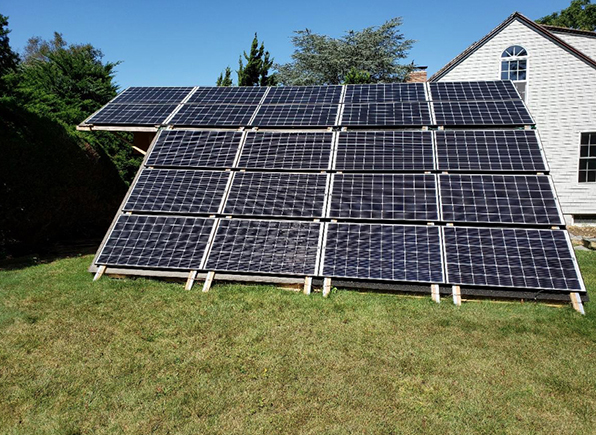Portsmouth Calls Solar Array Shed; Says It Must Be Removed
June 30, 2022

PORTSMOUTH, R.I. — State lawmakers recently celebrated the passage of another law designed to reduce climate emissions and promote renewable energy. Gov. Dan McKee signed the 100% Renewable Energy Standard, which requires all retail electricity sold in the state by 2033 be offset by renewable energy credits. An important addendum to last year’s Act on Climate law, which set greenhouse gas emission reduction mandates.
While lawmakers bask in glitzy photo ops and pat themselves on the back, municipalities have taken different, restrictive, and sometimes erratic turns toward renewable energy.
Portsmouth homeowner Christopher Burnett learned this lesson firsthand. A Navy veteran and self-described multi-decade renewable energy advocate, Burnett installed a ground-mounted solar array on his Sea Meadow Drive property in early spring 2019.
“My goal was to get that up and operating and to offset my electric bill and isolate my circuits from the grid, which I found over time saves a great deal of money on my appliances,” Burnett said.
Despite Portsmouth having no regulations governing solar installations, the town cited him with two violations: building an accessory structure and/or electrical system without a permit; and failing to place the shed — what the building department decided to classify the solar system — in the back yard.
Burnett filled out a state solar permit and said he sent it to the building department, but contested the rest of the violations. The town took him to Municipal Court in September 2019, where he was found guilty of the violations the following year. On Dec. 16, 2020, the court started imposing a fine of $100 a day until Burnett took “remedial action.”
“I don’t wanna rip this thing down,” he said. “The only thing I was ever offered.”
The fines have accrued daily since the last court date, and today total more than $56,000. Burnett has another court date scheduled for July 20 to settle the fines or have a lien placed on his house per a court summons signed by town solicitor Cort Chappell.
Building official Gareth Eames declined to provide ecoRI News with comment, saying the matter was still pending in court.
Chappell, who has been involved in the case since the start, declined to comment on any specifics.
“It has never been the goal of the Court or the Town to be a punitive tool, but per diem fines are put in place to compel people to get their non permitted structures either permitted or moved to be in compliance,” Chappell wrote in a June 30 email to ecoRI News. “As long as people work with us to seek permits or alter or remove structures to be in compliance, the recommendations to the Judge by my office and the Judge’s decisions, have in my opinion, been very equitable.”
The system Burnett designed is similar to one on his New Hampshire property, where he now lives full time — 24 solar panels, fixed at a 43 degree angle, capture solar energy, turning it into DC electricity, before turning into AC through inverters. The power is stored in an off-grid battery backup on-site, and Burnett estimates from April to October, the sunny months of the year, it provides 90% of the house’s electricity.
The solar system at his Portsmouth property has 22 panels — each one is 5.4 feet by 3.3 feet. He said it takes up less than 1% of the property’s space. He said he built the 392-square-foot array on the lawn on one side of the house because it was the only location where the production provided a reasonable 9-year payback.
The ground-mounted array, which faces due south, itself is not visible from the road and is barely visible to abutters. Tall and dense shrubs and vegetation surround Burnett’s property, with only the very top of the solar panels visible from one direction. He said the system is not a shed.
The town may not actually have had the regulatory authority to permit for his solar system in the first place, according to Burnett. The town granted Portsmouth Solar a special-use permit in 2016, but later the town lost on appeal of the Zoning Board of Review’s decision to allow a 2.9-megawatt solar facility on former farmland in the middle of town.
Superior Court Judge Brian Van Couyghen ruled the Zoning Board of Review had exceeded its statutory authority when it granted the special-use permit.
Portsmouth struggled to pass a final solar ordinance during the past few years. Residents protested the first version of the ordinance, written by Chappell and passed in May 2020, contesting it was too vague and permissive for solar developers.
The ordinance has been amended at least two more times, and the Town Council approved a six-month solar development moratorium, similar to Warwick’s, last winter.
Burnett meanwhile applied for a special-use permit from the Zoning Board of Review in 2020; it was denied by a 3-2 vote. In its written decision, the board wrote that Burnett “had not satisfied the special use criteria because there had been no structural or electrical inspection to ensure the solar energy system does not present a hazard in the neighborhood or adversely affect public health, safety and welfare.”
“I’m caught in a catch-22,” Burnett said. “The building inspector hasn’t inspected and he refuses to inspect, and the court refuses to require him to do it. And because he won’t inspect, [applying] for a special-use permit isn’t going to work.”
Burnett no longer lives on Sea Meadow Drive, but rents the home to his son, a former Navy veteran who lives there with is wife and two children.
Categories
Join the Discussion
View CommentsRecent Comments
Leave a Reply
Related Stories
Your support keeps our reporters on the environmental beat.
Reader support is at the core of our nonprofit news model. Together, we can keep the environment in the headlines.
We use cookies to improve your experience and deliver personalized content. View Cookie Settings




So much bs.